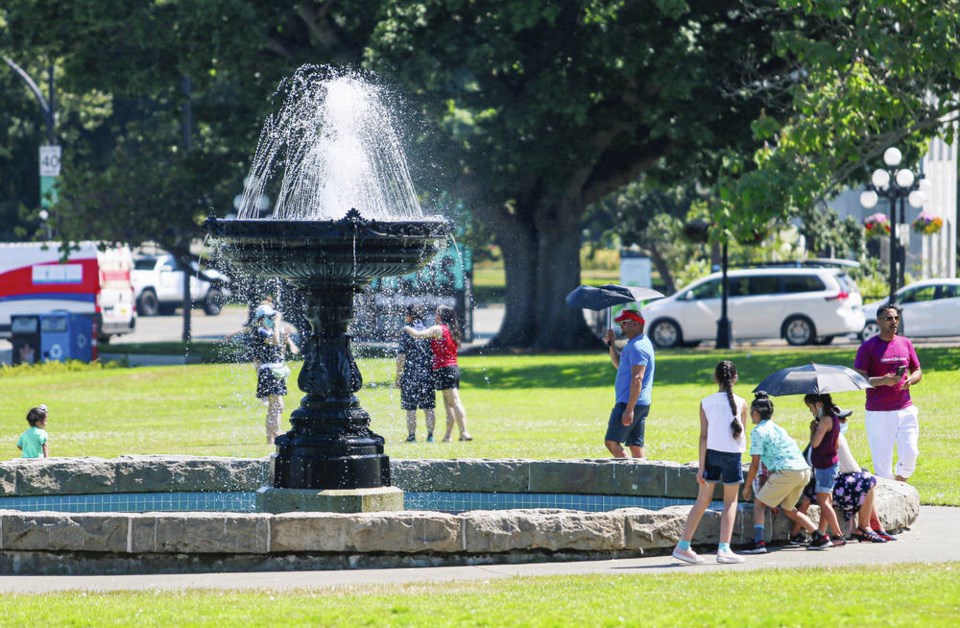Sweltering heat continued to force the cancellation of mass COVID-19 immunization clinics in arenas and community halls on Monday, while Island hospitals saw an increase of people with heat-related illness.
A vaccination clinic in Lake Cowichan that closed early on June 26 isn’t expected to reopen until Wednesday. At least two clinics closed early on Monday — Glacier Gardens Arena in Comox and the Ucluelet whole community clinic.
Provincial health officer Dr. Bonnie Henry said despite the cancellations, more than 95 per cent of appointments were completed as scheduled on the weekend.
“And I know our teams are working as fast as they can to try and rebook and make sure people are able to access vaccines as soon as possible, said Henry.
B.C. Health Minister Adrian Dix applauded health workers who moved swiftly as temperatures rose over the weekend to shift vaccination clinics to cooler locations, and administered 183,160 doses of vaccine from Friday to Sunday despite the heat.
In some cases, air conditioning failed and clinics had to be moved or hours adjusted, while some vaccination clinics held outside had to be rescheduled, Dix said.
Island Health cancelled or rescheduled clinics in Ladysmith, Langford, Esquimalt, Gabriola Island and Lake Cowichan over the weekend due to heat, it said Monday. Most people were contacted and rebooked.
Vaccinations appointments at Aggie Hall in Ladysmith for up to July 3 were moved to the Cedar Community Centre. The clinic at Eagle Ridge Arena in Langford closed at noon on Sunday and completely on Monday. Appointments at the Archie Browning Sports Centre in Esquimalt closed at noon Sunday and Monday7.
Gabriola Island’s whole community clinic was scheduled to begin on Monday but will start today instead and an additional day, July 6, was added.
Island Health said the majority of long-term-care sites have air conditioning and mitigation strategies to deal with heat. Sites without air conditioning are taking other steps, said the health authority, including keeping residents hydrated, shading windows, offering cool sponge baths to residents, and offering things like cold drinks, popsicles and ice packs.
Island Health’s long-term care program has been in communication with all facilities to ensure they have plans, said Island Health.
Seniors advocate Isobel Mackenzie said staff in long-term care residences know how to keep seniors cool — keep fluids up, apply cold washclothes and use air conditioners or fans — and she hadn’t heard of any heat-related incidents in facilities.
Mackenzie said she is more concerned about seniors living alone, especially in older apartment buildings that can become like greenhouses, and she urged people to check on older friends and family. “Older people may not realize they are overheating to the same degree we would,” she said.
“Even if it’s your mom, just don’t listen to her say ‘I’m fine,’ but check that she’s fine.”
As for the open window versus closed window argument, Henry had a firm prescription: “Open windows at night when the temperature outside gets cooler than the temperature inside. If you don’t have air conditioning, close your windows in the morning before the temperature outside gets hotter than the temperature inside — that helps the cooler air inside.”
With temperatures remaining high at night, people aren’t getting a reprieve, particularly in places without air conditioning, which is a health risk, said Henry.
Those living on the street are also at greater risk during extreme temperatures.
Our Place Society is handing out water bottles, sunscreen and hats to help people keep cool. The society’s drop-in centre, which is air conditioned and can hold 50 people, was busy over the weekend and Monday, said Grant McKenzie, communications director for Our Place.
“The big thing right now really is hydration and finding a cool place to be,” he said. “Luckily, so many people are housed now. And so they actually have a room of their own inside the hotels.”
The Greater Victoria Coalition to End Homelessness has compiled a list of organizations that are offering access to cool spaces, shade, water or sunscreen across the city, including public libraries, community centres, Our Place Society, Royal Athletic Park and AVI Outreach.
Kelly Roth, executive director of the coalition, urged people to look out for others who might be showing signs of heat exhaustion, and to call 911 if someone is unresponsive in the heat. “Because people would not survive very long if they pass out somewhere on the street,” she said.
— With files from Roxanne Egan-Elliott



